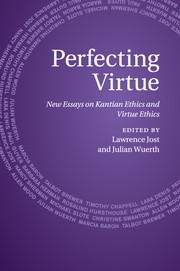Book contents
- Frontmatter
- Contents
- Notes on contributors
- Acknowledgements
- List of abbreviations
- Introduction
- 1 Virtue ethics in relation to Kantian ethics: an opinionated overview and commentary
- 2 What does the Aristotelian phronimos know?
- 3 Kant and agent-oriented ethics
- 4 The difference that ends make
- 5 Two pictures of practical thinking
- 6 Moving beyond Kant's account of agency in the Grounding
- 7 A Kantian conception of human flourishing
- 8 Kantian perfectionism
- 9 Aristotle, the Stoics, and Kant on anger
- 10 Kant's impartial virtues of love
- 11 The problem we all have with deontology
- 12 Intuition, system, and the “paradox” of deontology
- Bibliography
- Index
1 - Virtue ethics in relation to Kantian ethics: an opinionated overview and commentary
Published online by Cambridge University Press: 04 February 2011
- Frontmatter
- Contents
- Notes on contributors
- Acknowledgements
- List of abbreviations
- Introduction
- 1 Virtue ethics in relation to Kantian ethics: an opinionated overview and commentary
- 2 What does the Aristotelian phronimos know?
- 3 Kant and agent-oriented ethics
- 4 The difference that ends make
- 5 Two pictures of practical thinking
- 6 Moving beyond Kant's account of agency in the Grounding
- 7 A Kantian conception of human flourishing
- 8 Kantian perfectionism
- 9 Aristotle, the Stoics, and Kant on anger
- 10 Kant's impartial virtues of love
- 11 The problem we all have with deontology
- 12 Intuition, system, and the “paradox” of deontology
- Bibliography
- Index
Summary
BACKGROUND AND PLAN
This paper originated as the opening lecture for a conference for which I was to provide an overview of virtue ethics in relation to Kantian ethics. My initial plan was to discuss the unclarity about just what virtue ethics is, articulate the various views of what virtue ethics is, and then to consider whether, or the extent to which, Kantian ethics is compatible with virtue ethics on each of these conceptions. But I soon had misgivings about this plan. An attempt to sort out all the different ways virtue ethics is understood by its proponents – let alone an attempt to assess the compatibility of each conception with Kantian ethics – would take up far too many pages, and make for tedious listening. What concerned me more, however, was that it might be viewed by some as a hostile act. Some who align themselves with virtue ethics take umbrage at the claim that it is not clear just what virtue ethics is, and view with mistrust, and sometimes annoyance, efforts to disentangle various theses associated with virtue ethics and to determine which theses are central, which are not, and whether those that are central are not also held by (many) Kantians (or utilitarians).
At first I saw the problem simply as a “public relations” matter, a question of tact. How could I present the material without seeming hostile? But my attention shifted to the question of why it would seem hostile.
Keywords
- Type
- Chapter
- Information
- Perfecting VirtueNew Essays on Kantian Ethics and Virtue Ethics, pp. 8 - 37Publisher: Cambridge University PressPrint publication year: 2011
- 15
- Cited by

